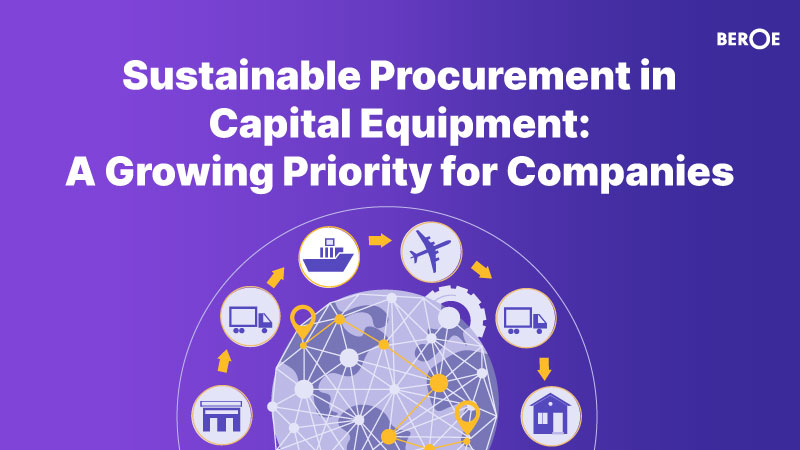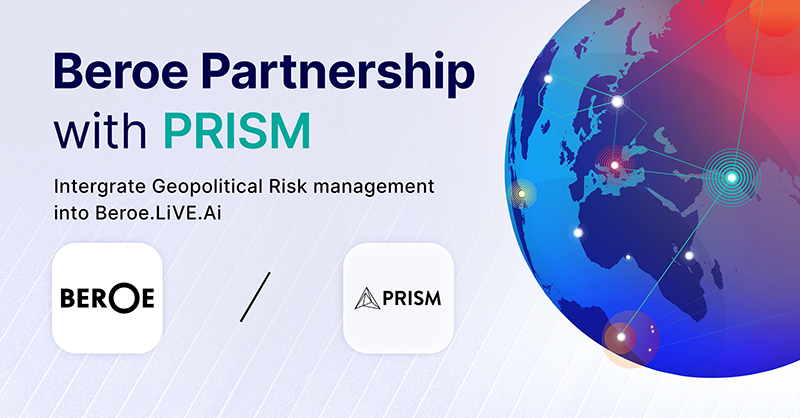Sustainable Procurement in Capital Equipment: A Growing Priority for Companies, says Beroe Inc
Source: PR Newswire

Feb 08, Raleigh, NC - Companies are increasingly incorporating sustainable procurement, which evaluates the environmental, social and economic impact of purchases and partnerships, into their decision making processes as consumer demand for sustainable products grows, forcing them to pay attention to not only their own operations but also those of their suppliers, as per latest Beroe research.
Sustainable Procurement is a term that has been gaining traction in recent years, as consumers and companies alike become increasingly aware of the impact of their purchasing decisions on the environment and society. Lately, there has been a shift in consumer buying behavior, with a growing demand for sustainable products and a willingness to pay more for them. In response, companies are being forced to take a closer look at not just their own operations, but those of their suppliers as well.
Procurement, as a control point in an organization, plays a crucial role in ensuring that third parties conduct business sustainably. Traditionally, the goal of a procurement team is to secure goods or services at the most favorable price and best quality for everyday operations.
However, Sustainable Procurement goes beyond this, taking into account the environmental, social and economic impact of a purchase or partnership, and integrating Corporate Social Responsibility (CSR) initiatives into the decision-making process, as per Beroe Inc, a leading Procurement Intelligence firm.
One of the industries where sustainable procurement is particularly important is the food and beverage and pharmaceutical sectors. In these industries, capital equipment such as machinery and production equipment can have a significant impact on the environment, and companies are looking for ways to reduce their environmental footprint.
For example, energy efficiency, use of renewable energy sources, water efficiency, and equipment lifetime are key sustainability indicators when purchasing capital equipment. These indicators vary depending on the type of equipment and are determined by the engineering team of the buyer. For example, when replacing a tablet/moulding machine, the new equipment should have a lower energy requirement per kg of final product, with a general practice of a minimum 10 percent energy efficiency improvement.
Once equipment is purchased and installed, its performance is monitored as a part of the operating plant's performance. The plant KPI scorecard, designed to track efficiency in terms of material, energy, water, and direct labor, is the main tool for monitoring the sustainability performance of each capital equipment.
To have better visibility on this performance tracking process, most pharmaceutical and food and beverage companies prefer a station-based scorecard rather than consolidating the entire plant in one scorecard. The KPI scorecard for the plant consists of a separate section per station, such as bioreactors, filters, moulding, packaging, etc. Some of the indicators include energy consumption, water consumption, and the amount of cleaning materials used.
Evaluating a supplier's sustainability performance can take various forms, including:
Direct Engagement: In this approach, the buyer establishes a dedicated team (often within the Vendor Assurance department) to conduct supplier site audits, implement and monitor sustainability initiatives, and create a scorecard for each supplier. Though effective, this method is not commonly used as it requires significant expertise and resources.
Third Party Engagement: In this method, the buyer works with a specialized third party to audit and score suppliers in terms of sustainability.
- The first option is for the buyer to engage with third parties for a supply chain monitoring solution. Third parties would then create reports or a scoring system, with action plans, which the buyer would follow up with the suppliers to implement.
- The second option is for the buyer to ask potential and current equipment suppliers to be audited or rated by a third-party reporting company, and use that information to choose suppliers. This option is more preferred as it simplifies the buyer's workload and reduces the burden on the procurement team.
Overall, sustainable procurement is becoming increasingly important as consumers demand products that are better for the environment and society. Procurement professionals play a crucial role in integrating CSR initiatives into the decision-making process and ensuring that third parties conduct business sustainably.
The food and beverage and pharmaceutical industries are particularly focused on sustainable procurement, with a focus on energy efficiency, use of renewable energy sources, and water efficiency when purchasing capital equipment. Additionally, performance is tracked using KPI scorecards to ensure that the equipment is operating in a sustainable manner.
For more such market data, insights, and intelligence check out Beroe LiVE.Ai™.
About Beroe:
Beroe is a global SaaS-based procurement intelligence and analytics provider. We deliver intelligence, data, and insights that enable companies to make smarter sourcing decisions – leading to lower cost, reduced risk, and greater profits. Beroe has been a trusted source of intelligence for more than 15 years and presently partners with 10,000 companies worldwide, including 400 of the Fortune 500 companies. For more information about Beroe Inc., please visit https://www.beroeinc.com/.
Media Contact:
Rob McMurtrie
rob.mcmurtrie@beroe-inc.com
Related News
View all
Beroe Makes Strategic Investment in Forestreet, Strengthening AI Capabilities and Driving Procurement Intelligence Innovation

Beroe introduces on-demand geopolitical risk analysis through PRISM enabling C-Suite to protect against ongoing supply chain disruptions
